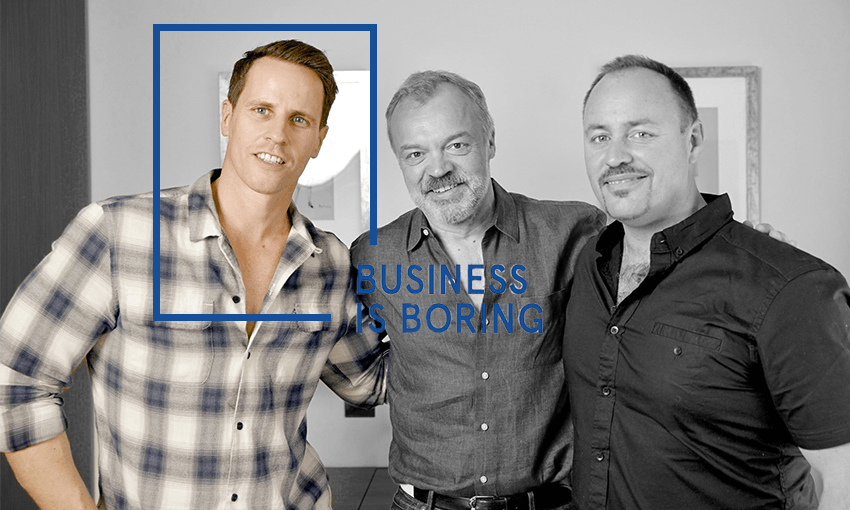Business is Boring is a weekly podcast series presented by The Spinoff in association with Callaghan Innovation. Host Simon Pound speaks with innovators and commentators focused on the future of New Zealand, with the interview available as both audio and a transcribed excerpt. This week Simon talks to Tim Lightbourne about how he built a wine company – with the help of Graham Norton.
A few years ago, over some drinks in a bar, two old friends who had taken different paths in life met up to talk wine. Tim Lightbourne, a marketer, and Rob Cameron, a winemaker, thought there might be room for a brand that removed the complexity around wine and made it more approachable. And so Invivo was born, made from two maxed-out credit cards and some grapes, as the legend goes.
From the beginning they were out to innovate – turning big name fans into big name partners and being one of the first to successfully crowdfund a wine company, with a record 2 million raised. Their Graham Norton partnership has seen them grow from 14000 bottles a year sold with his name on the front to 5 million. And here’s a stat – one in every ten bottles of NZ wine sold in Ireland is a Graham Norton number.
They are out crowdfunding again, to try to repeat this success in America. Tim Lightbourne joins me now to talk the journey, about taking over one of NZ’s oldest wineries with one of the newest acting companies, and what’s next.
Either download this episode (right click and save), have a listen below or via Spotify, subscribe through iTunes (RSS feed) or read on for a transcribed excerpt.
In 2007 a little Global Financial Crisis came down on you like a train. How did that disrupt your plans?
I don’t think we could’ve picked a worse time in history to launch a wine brand. 2008 was our first vintage, smack in the middle of the GFC, and we had a sauvignon blanc that we’d launched in what happened to be the largest ever harvest of sauvignon blanc grapes in the history of New Zealand.
If you imagine the two of us coming back to New Zealand, none of the trade in New Zealand knew us – Rob had been making wine for about seven years in Europe – and here we are trying to sell a sauvignon blanc that was in oversupply. You’d go into a shop and the retailer would have three or four hundred sauvignons and didn’t need another one from us.
Of course we approached the banks for an overdraft, we approached about five banks and we couldn’t even get an overdraft for the business. We weren’t millionaire guys or anything like that so it was super, super tough. It was pretty touch and go, I would say, for 12 or 24 months with the business. Basically everything we sold we just put back into the business.
There were months where we weren’t paying ourselves anything. We’d sell 12 bottles to a shop and that would go back into the fund. We found that to get sell through we actually had to stand in those shops ourselves on a Friday or Saturday or Sunday. I think I’ve met about half of New Zealand because we did 80 weeks in a row of standing in shops. We split them up around the country just to get that sell through.
That’s an amazing way to meet your customer, find out what they care about and get all of that feedback to go back into the product as well. It must be amazing to be standing at the Raumati liquor store and say “I’m the founder.”
Yeah, we always get that question, ‘which company do you work for?’ or ‘what marketing firm are you working for doing this tasting?’ We are the company, this is us. That struck a chord with people, seeing us standing in the store.
We learnt quickly how to talk to our consumers. At the start we were trying to tell them too much, and in actual fact they were just interested in ‘this is us, this is our wine, Rob here has made it, and this is how.’
That helped build a bit of a following for the brand around the country. When we first sold to the UK we got a retailer onboard for about 230 stores around the UK. As soon as the wine arrived into their store we jumped on a plane, stayed on some mates couches up in the UK, and tried to visit every one of their stores from Scotland in the north down to Southampton, down to Cornwall.
We wanted to do a little tasting at every store. That had never been done before with that retailer. The retail staff got behind us and we told the same story of it just being the two of us and again that helped to build a bit of a following because we didn’t really have a huge marketing budget at the time.


